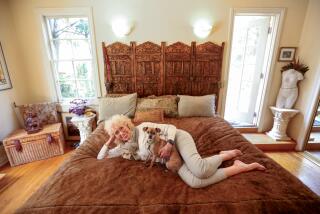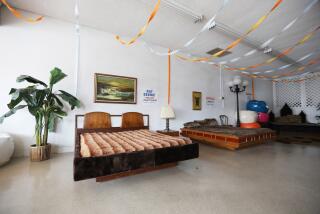Iraqi Public Baths Going Down the Drain
- Share via
BAGHDAD — Everyone is equal under the domed roof. There are no rich men or poor men. Only men without clothes sitting languidly on stone benches, soaking in clouds of steam to drain the dirt from their skin.
The picky opt for the 20-minute full body scrub by a masseur dressed only in shorts and vigorously wielding a horsehair mitt to scrape layers of dead skin and dirt with every stroke.
For centuries, these scenes have been repeated at the hammamat, or bathhouses, that have flourished in the Arab world since medieval times--when much of Europe had yet to discover soap, let alone plumbing.
Now the hammamat are running out of steam, falling victim to modernization.
In cities like Baghdad, Mosul, Cairo and Damascus, which boasted the best and oldest, many public baths have been demolished to make way for new neighborhoods, streets and shopping complexes.
Lack of business has forced others to close, their vast vaulted chambers, lit by sunlight filtering through colored glass on domed roofs, lying unused and crumbling.
“We are on the verge of extinction,” said Jamil Hamza Mashgoor, manager of the Rasheed Bath for Men, the oldest surviving bathhouse in Baghdad. He said only about 30 are left in the city, once home to about 100 hammamat.
The West knows such baths as Turkish baths, although they predate the Ottoman Turkish rule in the Mideast. In Arabic a bath is a “hammam,” the plural “hammamat.”
Baghdad’s baths have faced an extra blow from the nearly eight years of U.N. economic sanctions that crippled the economy and shrunk wages.
“People are saying, ‘It is better I wash at home rather than pay 350 dinars to get myself washed,’ ” said Mashgoor, who has run the Rasheed hammam for 40 years.
New customers could easily miss his establishment, which is entered through a rickety door, nestled in a row of shops on Rasheed Street, a chaotic marketplace along the Tigris River.
The door opens to a dark and dirty corridor leading into a wide, ill-lit chamber called the “menza,” where customers undress and where they return after bathing to sip tea in tiny glass cups and munch split beans.
Newer baths, such as the Hajmehdi Hammam in the upscale Karrada neighborhood, provide lockers. Towel-wrapped customers carry locker keys on elastic bands around their wrists.
Wearing rubber sandals, bathers at Hajmehdi clop through a doorway protected by a thick plastic curtain into the hammam, a large circular room. Stepping in, customers are hit by hot mist so thick that breathing is an ordeal. The smell of steam, soap and sweat rises from the scalding tile floor.
During peak hours one recent afternoon at the Rasheed hammam, two men sat hunched on a bench, drops of sweat trickling down their sticky hair. A naked middle-aged man reclined in a shallow stone bowl built into the floor, washing himself from the hot and cold taps extending from the white tiled wall. The other bathing basins were empty.
In its heyday, the Rasheed hammam used to serve about 1,000 people a day. “Now if we get 30 customers, we are lucky,” said Mashgoor, who is also the hammam’s masseur, or “muddalik.”
The decline of Iraq’s baths began in the 1980s when Iraq’s oil wealth reached its citizens. They began moving to suburbs into new homes with modern plumbing and some even with saunas.
To many, the hammamat were once a social retreat, something like the gentlemen’s clubs in England. Bridegrooms went for prenuptial cleansings.
For women, the baths provided the only refuge from the humdrum, cloistered life of conservative Muslim society. Women also used the pretext of nudity to check prospective daughters-in-law for physical flaws.
Often, the baths would be reserved for all-women parties with children, said Nasira al-Sadoun, director of the Baghdad Central Library, recalling her childhood days in the 1940s.
“Every week, my mother used to invite all the upper-class women of Baghdad, and servants used to clean their backs,” she said. “We took with us oranges, sandwiches, tea. Oh, it was a feast!”
More to Read
Sign up for Essential California
The most important California stories and recommendations in your inbox every morning.
You may occasionally receive promotional content from the Los Angeles Times.













